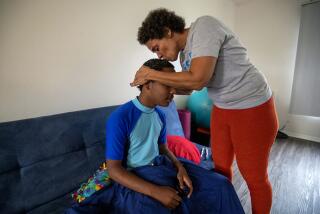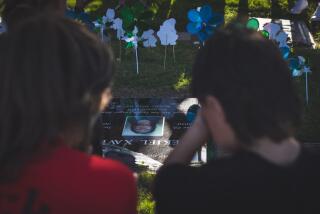Bearing witness to crises
- Share via
Joel told me a lot during the four days he was visiting Alex in the ICU.
Alex was the love of his life. Alex hadn’t seen his parents, now traveling in from the Midwest, in 11 years. Joel (all names have been changed) had been sober since he and Alex moved in together. But that, like everything else, ended on July 4, the day of Alex’s accident.
Joel was histrionic and brittle. He was also raging drunk. As Alex’s parents’ arrival neared, he stepped up the rhetoric about the couple he had never met. Alex’s dad was homophobic, probably closeted. Alex’s mom would be reasonable, but she lived in fear of her husband.
Joel told me that he would go to Lambda Legal Defense if they tried to keep him out of Alex’s life.
I told Joel that if he came to the hospital smelling like vodka again, I wasn’t going to let him in the door.
During the worst days of the HIV epidemic, I had to “out” a lot of young men to their parents in ICU waiting rooms. It was a common story: Boy leaves home, goes to the big city, falls in lust, falls in love, makes a new life, gets a cough, gets sick and then dies on a ventilator in the ICU.
I’d really hoped those days were over, I thought, as I walked up the four flights to meet Alex’s parents. Under the best of circumstances, this was going to be a devastating meeting.
When Alex dived into the shallow lake water and hit his head, he snapped the second and third vertebrae of his neck and crushed his frontal lobes. He was paralyzed from the neck down and in a coma.
With medics minutes away, no holiday traffic, and a friend who knew CPR, Alex was in our emergency department with a pulse before his hair was even dry. In any other city, he never would have survived -- though surviving as a C2 quadriplegic with massive brain injury is barely surviving.
I could have picked them out even if they hadn’t been alone in the waiting room. He: bald head, dark suit, flag pin, tasseled loafers; she: blond hair, pink dress, gold cross, sensible shoes. I presented the details of the case. Alex would be paralyzed and on a ventilator and would likely have severe brain damage if he pulled through. His prognosis was dismal.
She said nothing. He asked good questions. I could tell which way they were leaning.
At this point, when they’ve come to a decision, families often start to reminisce. We’ll share a laugh about a childhood nickname or a Thanksgiving cooking debacle.
Alex’s parents told no stories.
Like he was closing a business meeting, Alex’s dad stood up, offered his hand and said, “Thank you, doctor, for everything you’ve done. We’d like to spend a few minutes with Alex, and then I guess you will want a decision from us.”
Well, that part was easy.
“Look,” I said, “there is one more thing.”
Alex had a boyfriend, I told them. “I’d like you to meet him and, if possible, for him to be involved in these discussions,” I said.
My profession makes me a voyeur of these moments that change lives forever. Everything before this instant: a son who left home to explore the West, become a chef and didn’t call much because he was a loner.
Everything after this instant: a gay son who is dying and has a boyfriend.
“Joel, his name is Joel,” I continued. “You need to know that Joel doesn’t have any legal claims in this situation. But he has been with your son for over a year. I really hope that . . . “
Alex’s mom interrupted me. “Well, of course, we’ll meet the young man. Won’t we, dear?” She took her husband’s stunned silence as affirmation. I took it ominously.
I left the room, intending to return, but got paged about a new admission. One thing led to another, and it was two hours before I remembered I had left Alex’s parents to meet their son’s lover by themselves. I really hoped Joel was sober. At least there hadn’t been any overhead pages for security.
The conference room was empty, so I walked to the ICU.
Alex’s mother brushed her son’s matted blond locks from one side to the other as if she couldn’t quite get his hair to look the way she wanted. Alex’s father held the paralyzed hand of the son he barely knew.
Joel sat in a chair, arms draped over Alex’s knees, choking back sobs. No one said a word.
Hesitantly, Alex’s father reached out and put an arm around Joel’s shoulder.
--
gordon.rubenfeld@sunny brook.ca
More to Read
Sign up for Essential California
The most important California stories and recommendations in your inbox every morning.
You may occasionally receive promotional content from the Los Angeles Times.













